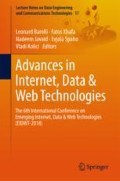Abstract
Ambient Intelligence (AmI) deals with a new world of ubiquitous computing devices, where physical environments interact intelligently and unobtrusively with people. AmI environments can be diverse, such as homes, offices, meeting rooms, schools, hospitals, control centers, vehicles, tourist attractions, stores, sports facilities, and music devices. In our previous work, we presented the implementation and evaluation of actor node for AmI testbed. In this paper, we introduce the implementation of the AmI testbed. We present the simulation results of the proposed Fuzzy-based Sleeping Condition System (FSCS) considering four parameters: room lighting, humidity, temperature and noise. The simulation results show that different parameters have different effects on human sleeping condition.
Access this chapter
Tax calculation will be finalised at checkout
Purchases are for personal use only
References
Lindwer, M., Marculescu, D., Basten, T., Zimmermann, R., Marculescu, R., Jung, S., Cantatore, E.: Ambient intelligence visions and achievements: linking abstract ideas to real-world concepts. In: Design, Automation and Test in Europe Conference and Exhibition, pp. 10–15 (2003)
Gabel, O., Litz, L., Reif, M.: NCS testbed for ambient intelligence. In: IEEE International Conference on Systems, Man and Cybernetics, vol. 1, pp. 115–120 (2005)
del Campo, I., Martinez, M.V., Echanobe, J., Basterretxea, K.: A hardware/software embedded agent for realtime control of ambient-intelligence environments. In: IEEE International Conference on Fuzzy Systems (FUZZ-IEEE), pp. 1–8 (2012)
Virtex 5 Family Overview. Xilinx Inc., San Jose, CA (2009)
Bernardos, A.M., Tarrio, P., Casar, J.R.: CASanDRA: a framework to provide context acquisition services and reasoning algorithms for ambient intelligence applications. In: International Conference on Parallel and Distributed Computing, Applications and Technologies, pp. 372–377 (2009)
Acampora, G., Cook, D., Rashidi, P., Vasilakos, A.V.: A survey on ambient intelligence in health care. Proc. IEEE 101(12), 2470–2494 (2013)
Aarts, E., Wichert, R.: Ambient intelligence. In: Bullinger, H.J. (ed.) Technology Guide. Springer, Heidelberg (2009). https://doi.org/10.1007/978-3-540-88546-7_47
Aarts, E., de Ruyter, B.: New research perspectives on ambient intelligence. J. Ambient Intell. Smart Environ. 1(1), 5–14 (2009)
Vasilakos, A., Pedrycz, W.: Ambient Intelligence, Wireless Networking, and Ubiquitous Computing. Norwood, Artech House Inc, MA, USA (2006)
Sadri, F.: Ambient intelligence: a survey. ACM Comput. Surv. 43(4), 66 (2011)
Kandel, A.: Fuzzy Expert Systems. CRC Press, Boca Raton (1992)
Zimmermann, H.J.: Fuzzy Set Theory and its Applications, 2nd edn. Kluwer Academic Publishers, Boston (1991)
McNeill, F.M., Thro, E.: Fuzzy Logic: A Practical Approach. Academic Press Inc., San Diego (1994)
Zadeh, L.A., Kacprzyk, J.: Fuzzy Logic for the Management of Uncertainty. Wiley, New York (1992)
Procyk, T.J., Mamdani, E.H.: A linguistic self-organizing process controller. Automatica 15(1), 15–30 (1979)
Klir, G.J., Folger, T.A.: Fuzzy Sets, Uncertainty, and Information. Prentice Hall, Englewood Cliffs (1988)
Munakata, T., Jani, Y.: Fuzzy Systems: an overview. Commun. ACM 37(3), 69–76 (1994)
Author information
Authors and Affiliations
Corresponding author
Editor information
Editors and Affiliations
Rights and permissions
Copyright information
© 2018 Springer International Publishing AG
About this paper
Cite this paper
Bylykbashi, K., Obukata, R., Liu, Y., Spaho, E., Barolli, L., Takizawa, M. (2018). Application of Fuzzy Logic for Improving Human Sleeping Conditions in an Ambient Intelligence Testbed. In: Barolli, L., Xhafa, F., Javaid, N., Spaho, E., Kolici, V. (eds) Advances in Internet, Data & Web Technologies. EIDWT 2018. Lecture Notes on Data Engineering and Communications Technologies, vol 17. Springer, Cham. https://doi.org/10.1007/978-3-319-75928-9_4
Download citation
DOI: https://doi.org/10.1007/978-3-319-75928-9_4
Published:
Publisher Name: Springer, Cham
Print ISBN: 978-3-319-75927-2
Online ISBN: 978-3-319-75928-9
eBook Packages: EngineeringEngineering (R0)

